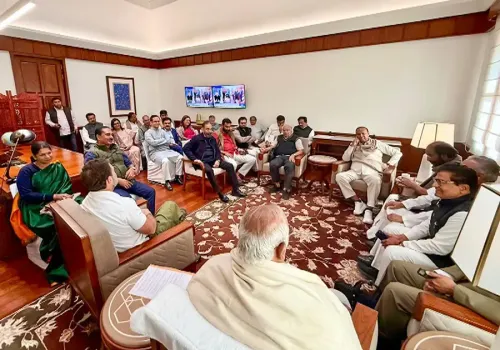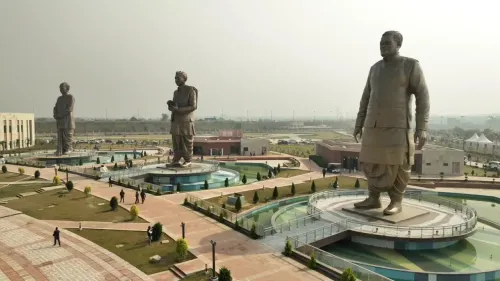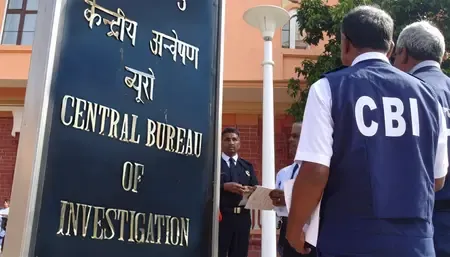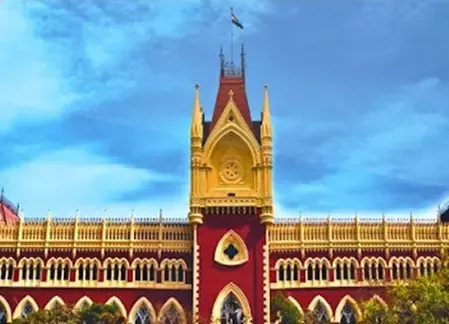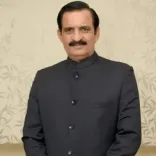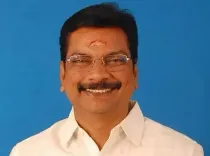Has BJP Turned the Tables on Rahul’s ‘Vote Chori’ Accusations?
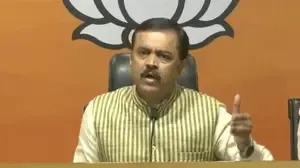
Synopsis
Key Takeaways
- Congress's vote share has drastically declined over the decades.
- BJP counters Congress's claims by highlighting historical defeats.
- Influential leaders have played a role in Congress's decline.
- Modi's regime is viewed as a turning point in Congress's political fortunes.
- Political narratives shape public perception and electoral outcomes.
New Delhi, Sep 12 (NationPress) As Rahul Gandhi and the Congress party intensify their claims of ‘vote chori’, rallying support from the weaker and marginalized communities, the Bharatiya Janata Party (BJP) has stepped up to counter these allegations of voter fraud and manipulation of electoral rolls.
In a new twist to the Congress party's ‘vote chori’ narrative, BJP spokesperson GVL Narasimha Rao pointed out that the Congress has faced significant electoral defeats numerous times between 1984 and 2024, influenced by various parties and leaders from those specific ‘eras’. Thus, he argues that their accusations of electoral malpractice against the Modi government are 'misdirected and misplaced'. He highlighted at least 10 instances when Congress governments were ousted after substantial electoral losses.
Rao criticized Congress for blaming the Modi administration for its electoral setbacks, a pattern that stretches back to 1989 and continues until 2025. He also noted the party's vote percentage has been in a continuous decline over three decades, from 1989 to 2025.
According to Narasimha Rao, the Congress party's most dismal performance occurred in 2014, where it secured just 44 out of 543 seats, achieving a mere 19.5 percent vote share, a trend that persisted through three terms of the Modi regime.
“Who can be held accountable for the loss of votes from 49.1 percent in 1984 to 19.5 percent in 2014? In Rahul Gandhi’s terms, who are the ‘Vote Chors’ that pilfered Congress votes?” he questioned.
Referring to a poll analyst, Rao outlined a series of leaders categorized into 10 eras, who could be seen as fitting the definition of ‘vote chors’ according to Rahul Gandhi's perspective.
He described the VP Singh-led Janata Dal government as the first ‘vote chor’, as it significantly reduced Congress's parliamentary representation in the 1989 elections, halving its seat count from 404 in 1984 to a mere 197 in 1989, with a steep drop in vote share from 49.1 percent to 39.5 percent.
In this context, Mulayam Singh Yadav and Mayawati were labeled ‘Vote Chors 2 and 3’, as they played pivotal roles in marginalizing Congress in Uttar Pradesh during the 1993 elections. The two regional leaders' impact forced Congress to the fringes in UP politics, a setback from which it has yet to recover. In the 1985 Assembly elections, Congress captured 269 out of 425 seats, but by 1993, it plummeted to just 28 seats and a mere 15.1 percent vote share.
“Congress’s dominance in West Bengal waned after Jyoti Basu assumed office in 1977, leading to a gradual decline during his 24-year tenure. Since the establishment of the Mamata-led TMC government, Congress has shrunk to a non-entity in West Bengal politics,” he stated, suggesting that both Basu and Banerjee could be termed ‘vote chors 4 and 5’ under Rahul Gandhi’s definition.
Continuing the examination of Congress's decline, Rao identified Sharad Pawar, Lalu Prasad Yadav, Karunanidhi, Stalin, Shibu Soren, Hemant Soren, and Arvind Kejriwal as ‘Vote Chors 6 through 10’, based on Rahul’s standards of political integrity.
Congress's influence in Maharashtra diminished with the formation of Sharad Pawar-led NCP in 1999, with its vote share declining from 51.2 percent in 1984 to 18.3 percent in the 2014 elections.
Bihar was pivotal in Congress's 1984 tally of 404 seats; however, the ascent of Lalu Yadav marked a downward trajectory, with Congress’s vote share plummeting from 51.8 percent in 1984 to just 8.6 percent in 2014.
“In Tamil Nadu, Congress’s vote share fell from 40.5 percent in 1984 to a dismal 4.4 percent in the 2014 Lok Sabha elections. Who will Rahul Gandhi hold accountable for this decline and the supposed ‘vote chori’ in Tamil Nadu?” the former BJP MP questioned.
Congress's downfall in Jharkhand coincided with the rise of the Soren duo, whom Narasimha Rao referred to as ‘vote chor no 9’.
“Will Rahul Gandhi clarify why he is in coalition with ‘Vote Chor’ Hemant Soren in Jharkhand?” he asked.
Narasimha Rao further pointed out that the emergence of Arvind Kejriwal led to the Congress party's collapse in Delhi.
It is noteworthy that Congress clinched 52 out of 70 seats in the 1998 Delhi Assembly elections, but failed to win any seats in the subsequent elections of 2015, 2020, and 2025.
Challenging the ‘unholy alliance’, Rao asked, “Why did Congress choose to collaborate with the notorious ‘Vote Chor’ Arvind Kejriwal for the 2024 Lok Sabha elections, and why does Rahul Gandhi continue to maintain a fluctuating association with Kejriwal in the ‘INDI’ Alliance?”
Ultimately, he remarked that the Modi era has served as a significant turning point for the Congress party, exacerbating its diminishing fortunes through successive defeats in the 2014, 2019, and 2024 elections.
“It is crucial for the Congress party to understand that fabricating narratives and engaging in opportunistic politics might provide momentary visibility but cannot alter historical realities,” he concluded.


